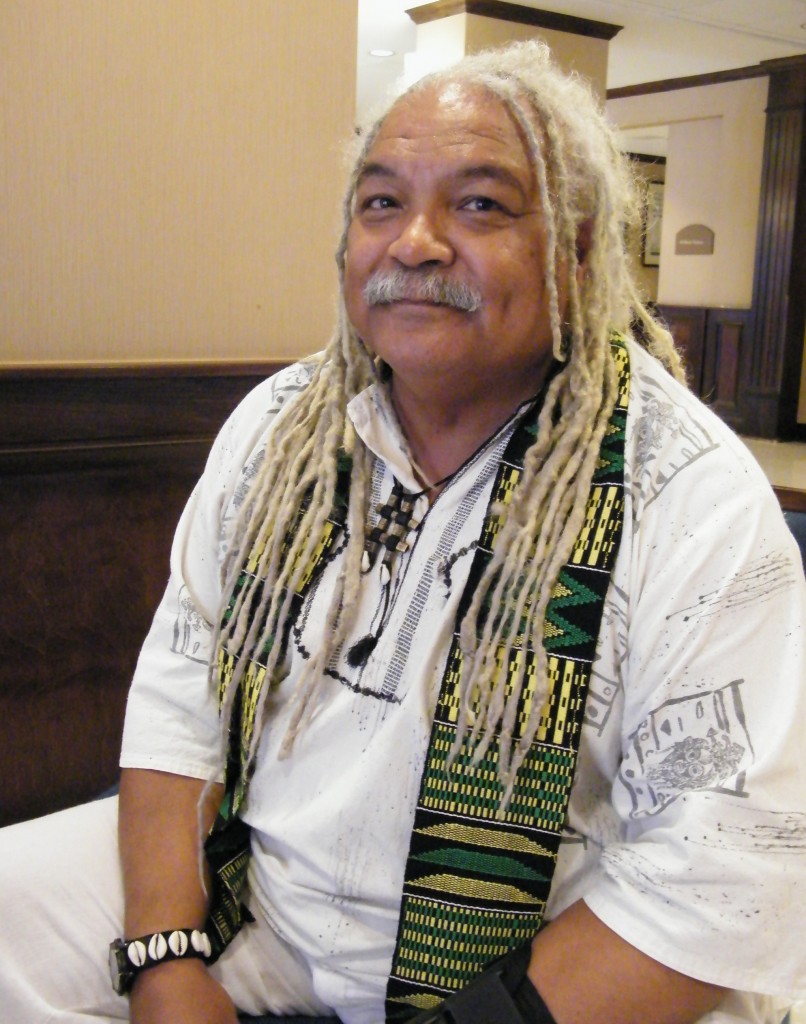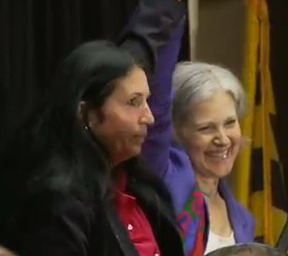Racial issues add controversy as Green Party nominates national ticket
By Dana Amihere
dana@marylandreporter.com
George Martin stood out if you saw him at the Green Party national convention in Baltimore this weekend. A portly round-faced man, he sports white and silver dreadlocked hair dangling past his shoulders. Although he’s been active with the Green Party for more than a decade and is an international peace activist, he doesn’t look like what has been characterized as a “typical” Green Party member –– he’s black.
There’s no denying that the Greens are colorblind when it comes to running for office. Numerous blacks and Latinos have won seats at the state and local levels. They nominated black congresswoman Cynthia McKinney of Texas to take on Barack Obama in the 2008 election, and this year’s vice-presidential candidate, Cheri Honkala, is a Native American welfare rights advocate from Philadelphia.
Some of the most recent conversations about race within the party, though, have been related to Roseanne Barr’s endorsement by its Black Caucus. Saturday’s convention at downtown Holiday Inn quickly became a battleground when Barr’s delegation coordinator, national party co-chair Farheen Hakeem, made what some considered racist accusations against several party members in a speech. Martin said that the “race card” only served to highlight the type of disagreement you might find in any political party.
“It’s no question of racism. It’s very poor that someone not a member of the caucus was speaking on our behalf and creating this distraction,” said Martin, founder of the Greens’ Black Caucus. “We’re not going to put focus on 10 minutes of negative attention at this historic national convention.”
Growing pains
The internal fights over race is perhaps a sign of the party coming into its own.
Several of the party’s 10 key values, including social justice, equal opportunity, economic justice and respect for diversity dovetail with many minority communities’ primary concerns.
Martin, former co-chair of the Wisconsin Green Party, said that two whites –– David Cobb and now Massachusetts physician Jill Stein –– were chosen to run for president in the party’s short national history and the caucus’s endorsement of Barr wasn’t a slight to the black community. (Ralph Nader was the nominee in 1996 and 2000.)
“I deal with racism in my community. I fight Nazis. I organize against the Ku Klux Klan. I’m right there in front of it [racism], and there’s just no race card to be drawn here. That outburst was an embarrassment,” Martin said, “and its innuendo was a shunning of black leadership.”
What it means to be Green
The Greens have been characterized as “eco-socialists” for their stances on environmental economics such as the Green New Deal and universal services such as Medicare For All and free public higher education.
One of the fundamental values of the group is their refusal to accept money from corporations, labor unions, political action committees, their executives or their lobbyists –– or as Stein calls it “money with strings attached.”
“We don’t accept corporate money because campaign finance is part of the problem,” Martin said. “We know about the 99%, and we know about the growing gap between the rich and the poor. The Occupy movement has helped bring that out very clearly.”
Many parallels have been drawn between the Greens and the Occupy movement which grew out of New York’s Zuccotti Park: grassroots work for social justice, peaceful protest, crusaders against the Wall Street “too big to fail and too big to jail.”
But like the Occupiers, however, the Greens’ are extremely homogeneous. Stein and Honkala have identified this as an area the party needs to work on to continue to grow.
“We have a long history of addressing economic justice. [On these issues] people of color are in the driver’s seat,” Stein said, because they are the ones largely affected by these issues.
“We live in a country that’s wealthy and where there’s enough to go around. But one in two Americans is living in poverty or just above it as low-income,”Honkala said.
“People are struggling just to get that carton of milk,” she said. The system didn’t happen by accident. We’re here as a reality check to the presidential mockery.”

MarylandReporter.com is a daily news website produced by journalists committed to making state government as open, transparent, accountable and responsive as possible – in deed, not just in promise. We believe the people who pay for this government are entitled to have their money spent in an efficient and effective way, and that they are entitled to keep as much of their hard-earned dollars as they possibly can.


